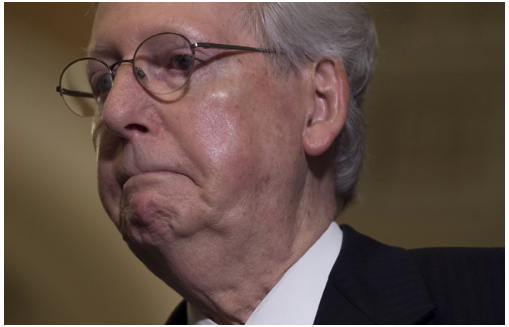CommentsI want to be the first to congratulate the Republican Party on passing a health care bill based on conservative principles that will help millions of people. It's called Obamacare. The Democrats passed it for you in 2010.
During the debates around the Trumpcare bills, no Republicans were able to make an affirmative case for why their plans would make Americans healthier. That's because the right wing has gone to war—quite successfully, if we judge by election results—against its own best idea for improving American health care.
With the Better Care Reconciliation Act seemingly dead in the Senate, and Majority Leader Mitch McConnell pushing for repeal and figure-it-out-later, there's been a new call from some Republican Senators (Susan Collins of Maine, Lisa Murkowski of Alaska, John McCain of Arizona) for a bipartisan approach. If they're serious, they should just make some sensible tweaks to the Affordable Care Act, apologize for seven years of GOP intransigence, and call it a day.
Here's a little history. A long long time ago (let's call the 1990s), there was broad consensus across our political landscape that the government should find a way to improve access to health care in the richest nation on Earth. The partisan divisions were not so much about whether, but how. Republicans and Democrats debated the specifics of keeping costs down, the role of private industry, and optimal funding mechanisms. Three main options emerged.
First, some folks on the left proposed a single-payer system, which these days we tend to call "Medicare for all." The argument for this approach is that we already have a national health-care system for the elderly, so let's just make sure it works better and allow everyone to sign up for it. At the time, this was a fringe position. It never advanced under the Clinton-era attempts to universalize health care. In 2009, Democratic Senator Max Baucus of Montana shut single-payer advocates out of the process that led to Obamacare—something I've always regarded as one of the great blunders in modern political history, as the threat of single-payer might have inspired the GOP to cooperate with more centrist options.
The other Democratic position became known as the "public option." Health care would remain private, under this model, but the government would run a plan that would compete on the market. Industry, of course, panicked and lobbied moderate Democrats. Republicans characterized the public option as socialized medicine (it isn't, really). The middle, then, turned to the right-wing third option: public exchanges plus an individual mandate.
The exchanges system came out of the Heritage Foundation, a right-wing think tank. As the Clinton-era debates about health care roared through Congress, eventually stalling and leading to the 1994 GOP takeover of Congress, the Heritage Foundation and its congressional allies started proposing a system of public health-care exchanges matched with an individual mandate that forced people to buy health care or pay a small fine. These ideas took form as Romneycare in Massachusetts, and eventually provided the core of the Obamacare system.
As journalist David Bernstein observed in February, the GOP that invented a public exchange solution was a very different party, one that still believed in solving problems. It endorsed directed markets, where the government creates a carefully defined system in which companies can compete to address major issues. Obamacare is the most visible directed market system today, but once upon a time the GOP thought "smart guns" would lead to better gun safety and more profits, and that "cap and trade" would solve climate change. Today, the GOP doesn't believe we need gun safety, doesn't believe in climate change, and has no plan to improve access to health care.
The Affordable Care Act, which linked right-wing exchange/mandate systems to a left-wing expansion of Medicaid, was a pretty good bill. It's helped a lot of people. A massive study from the Kaiser Family Foundation shows that Medicaid-expansion states have demonstrated particularly good public-health outcomes. It could use some tweaks to stabilize the exchanges and spread Medicaid expansion throughout the country, and that's where the Republicans come in.
It's time to take credit for your good ideas! Don't worry, you'll still have liberals—like me—yelling about Single Payer Now (which would honestly be so much better, done right). You'll be able to go on to Fox News and claim you're irritating the Democrats by promoting sensible Republicans' market-based solutions to improving health care. You'll probably even hold your Congressional majorities if you do this right, which is too bad from my perspective, but a small price to pay for keeping millions of people insured.
In the '90s, the best minds on the left and the right came up with three ways to fix American health care: single payer, public option, health-care exchanges. The Democrats went with the most conservative of the three in 2010. The Republicans decided to demonize the results for political gain. Now, they are stuck. They can't go further to the right and still help people. Americans, it turns out, actually like Medicaid and affordable care. So take a victory lap. Reclaim your own ideas. And let's start solving problems again.
(David M. Perry is a professor of history at Dominican University, contributing writer at Pacific Standard, … where this column first appeared … and freelance journalist focused on disability, parenting, history, and education.)















